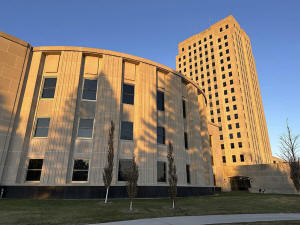Ruling in North Dakota case erases path for people in 7 states to sue
under the Voting Rights Act
[May 15, 2025]
By JACK DURA
BISMARCK, N.D. (AP) — A federal appeals court that already has said
private individuals and groups cannot sue under a key part of the
federal Voting Rights Act went even further Wednesday toward blocking
lawsuits over alleged racial bias in voting in seven Midwest states.
But its decisions may not be the last word, because another appeals
court has ruled differently, and the U.S. Supreme Court might have to
resolve the conflict. The latest ruling reversed a legal victory for two
tribal nations in North Dakota that challenged a legislative
redistricting plan.
The ruling shuts off a route to Section 2 of the Voting Rights Act
through a federal civil rights law known as Section 1983, which allows
people to sue state officials to vindicate their federal or
constitutional rights, said Jonathan Topaz, staff attorney for the
American Civil Liberties Union Voting Rights Project. Section 1983
provides a legal vehicle to bring a lawsuit, he said.
Private individuals in past decades brought lawsuits under Section 2,
but a 2023 8th Circuit ruling in an Arkansas redistricting case held
that Section 2 doesn't allow for private claims. That ruling and
Wednesday's ruling only apply to the 8th U.S. Circuit Court of Appeals,
which encompasses Arkansas, Iowa, Minnesota, Missouri, Nebraska, North
Dakota and South Dakota.
“These decisions together at the moment mean that no one can sue under
the Voting Rights Act in the seven states that comprise the 8th Circuit,
other than the U.S. Attorney General,” said Mark Gaber, senior director
for redistricting at Campaign Legal Center and an attorney for the
Spirit Lake Tribe and Turtle Mountain Band of Chippewa Indians.

The majority opinion Wednesday said that in order to use Section 1983 to
file lawsuits over voting rights, including how redistricting affects
them, a private person or group must “unambiguously” have the right to
sue under Section 2 of the Voting Rights Act.
Appeals Judge Raymond Gruender, appointed by George W. Bush and writing
for the majority, said that while the tribes “are within the general
zone of interest” of the Voting Rights Act, it is “without the statute
having unambiguously conferred an individual right.”
In a dissent, Circuit Chief Judge Steven Colloton, another Bush
appointee, said Section 2 of the Voting Rights Act does confer a right
to sue and he would have upheld the tribes’ legal victory on
redistricting.
Wednesday's decision and the Arkansas ruling "create circuit splits” on
the Section 2 and Section 1983 issues because the 8th Circuit is the
only court to rule in such a way in both instances, Gaber said. The
tribes and their attorneys are discussing and considering appeal
options, he said.
The 2-1 ruling is a reversal for the two tribes, who had successfully
challenged North Dakota's 2021 redistricting map, alleging it dilutes
their voting strength.
[to top of second column]
|

Sunlight illuminates the exterior of the North Dakota House of
Representatives and the state Capitol tower in Bismarck, N.D., on
Nov. 10, 2023. (AP Photo/Jack Dura, File)

The tribes wanted to share a single legislative district, electing a
state senator and two House members, making it more likely that all
three would be Native American. The 2021 plan split them into
different districts. The court-ordered plan gave the tribes what
they wanted.
Spirit Lake, Turtle Mountain and several tribal citizens alleged
that the 2021 map drew the lines so that while Turtle Mountain
members still could elect a House member, the Spirit Lake members
could not.
In late 2023, U.S. District Court Chief Judge Peter Welte ruled
after a trial, saying the Legislature's map “prevents Native
American voters from having an equal opportunity to elect candidates
of their choice" in violation of the Voting Rights Act's Section 2.
In early 2024, the judge ordered a new map into place with a joint
district for the two tribes. Their reservations near the Canadian
border and in northeastern North Dakota, respectively, are about 60
miles (97 kilometers) apart. Later that year, voters elected three
Native Americans, all Democrats, to the district's seats.
Republican Senate Majority Leader David Hogue said the 2021
boundaries the Legislature drew “will be the boundaries." Somehow
officials will have to address the seats of incumbents affected by
the boundaries at question, potentially by special election, he
said.
“I think the Legislature was very comfortable with the fairness of
the boundaries that they drew in 2021, and I think we should
endeavor to uphold those boundaries,” Hogue said.
In a statement, Secretary of State Michael Howe's office said it
will now work with the 2021 map in place for the 2026 elections,
“pending any further actions.”
Republicans control North Dakota's Legislature by 83-11 in the House
and 42-5 in the Senate. The state's biennial legislative session
concluded earlier this month.
___
Associated Press reporter John Hanna contributed from Topeka,
Kansas.
All contents © copyright 2025 Associated Press. All rights reserved
 |